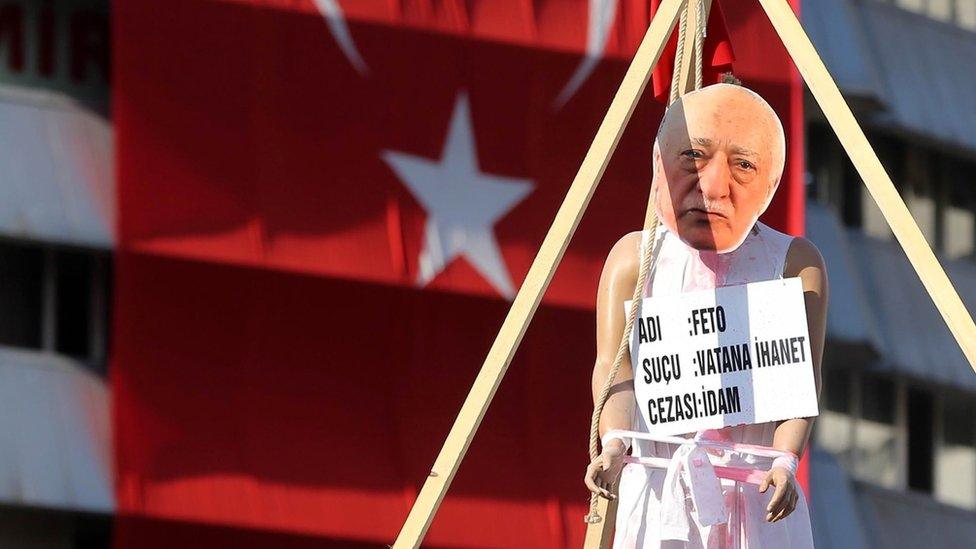Europe rights official urges Turkey to heed rule of law
- Published
Three Turks who lost their jobs after last month's failed coup say they have nothing to do with the Gulenists.
The most senior European official to visit Turkey since last month's attempted coup has urged Turkey to act according to the rule of law.
Thorbjorn Jagland, secretary general of the Council of Europe, is meeting key government figures.
He said he understood Turkey's need to "take on those behind the coup" but urged it to adopt judicial safeguards.
More than 50,000 Turks have been detained or sacked over suspected links with the alleged mastermind.
But US-based cleric Fethullah Gulen denies any role in the attempted overthrow.
Turkish officials are expected to tell Mr Jagland the government is not getting sufficient support from its Western partners, say correspondents.
How do Turks in Europe see Erdogan?
What you need to know about failed coup
Mr Jagland's organisation monitors human rights compliance among the Council's 47 members, including Turkey.

What is the Council of Europe?
Based in Strasbourg, it is a body of 47 countries, external that aims to promote democracy and protect human rights. It is not an EU institution, but the 28 member states and all the candidate countries are members. It set up the European Convention on Human Rights, and cases relating to the convention are brought before the European Court of Human Rights.

Standing beside Turkish Foreign Minister Mevlut Cavusoglu shortly after arriving in Turkey, Mr Jagland told the media that the coup attempt had been "outrageous" and "there has been too little understanding in Europe" on how a secret network had infiltrated the army and judiciary.
"We see a need for cleaning up all this - but is is important that this is done in conformity with the rule of law and the standards in the European convention on human rights and the case law of the [European] Court of Human Rights," he said.
He will also meet President Recep Tayyip Erdogan, Prime Minister Binali Yildirim, the justice minister and the heads of opposition parties.
Tensions between the Turkish leadership and the country's ostensible Western allies have surged over his response to the coup.
Extradition spat
"Does the West take the side of democracy or coup? I think that they take the side of coup", President Erdogan was quoted as saying in a combative speech from his palace in Ankara on Tuesday.
The "script" for the abortive revolt was "written abroad", he said.
And he singled out the the US for particular criticism, over its failure thus far to extradite Mr Gulen. The US says it is still studying the case for extradition.

Effigies of Mr Gulen have been a frequent feature of protests in support of President Erdogan's government since last month's attempted coup
Tens of thousands of people have been detained, dismissed or suspended from roles in the military, judiciary, civil service and education.
Research scientists have become the latest people to be detained when officers made arrests during a search at the campus of the national Scientific and Technological Research Council near Istanbul.
When the Turkish government declared a three-month state of emergency after the coup, it automatically suspended its adherence to the European Convention on Human Rights and there have been allegations of mistreatment of some of those detained in connection with the coup.
That will be uppermost on Mr Jagland's agenda, reports the BBC's Jonathan Head in Istanbul. But he will also hear a list of grievances from his hosts over the what they perceive as lacklustre support from the EU and the United States - no other senior political figures have visited Turkey since the coup.
Italian sarcasm
Three Turkish parliamentary delegations have been despatched to London, Brussels and Washington to put the government's case.
The Italian Prime Minister Matteo Renzi illustrated the increasingly overt European disquiet about Mr Erdogan's approach to the rule of law in a tweet on Tuesday.
It came after Mr Erdogan criticised an Italian investigation into his son over suspected money laundering in an interview on Italian TV, in which he suggested judges pursue the mafia instead.
"In this country the judges follow the law and the Italian constitution, not the Turkish president. That's called 'the rule of law'," Mr Renzi said, external.